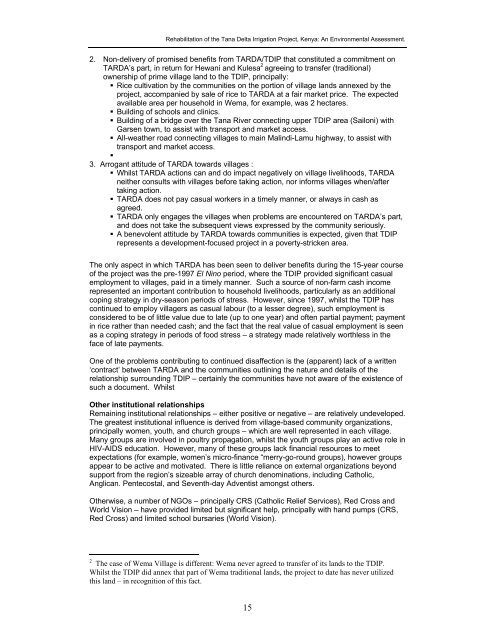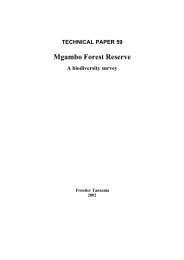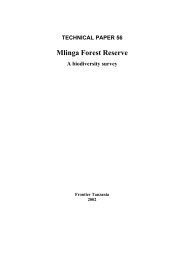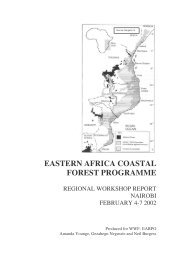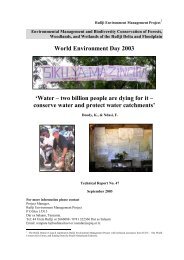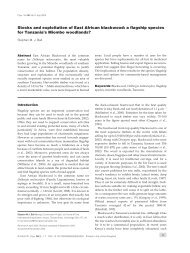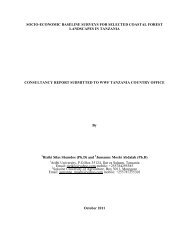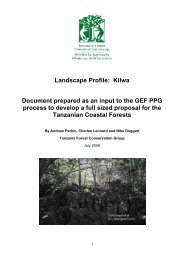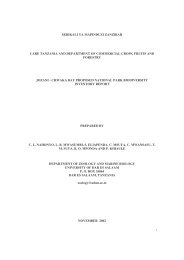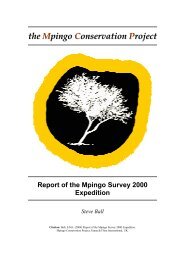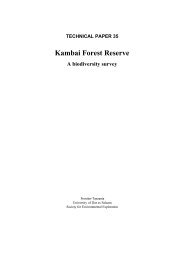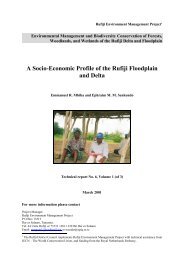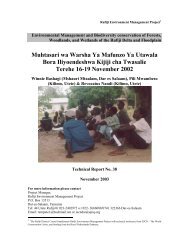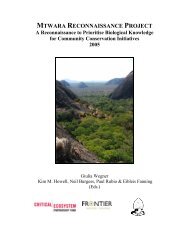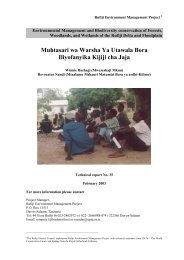Tana Delta Irrigation Project, Kenya: An Environmental Assessment
Tana Delta Irrigation Project, Kenya: An Environmental Assessment
Tana Delta Irrigation Project, Kenya: An Environmental Assessment
Create successful ePaper yourself
Turn your PDF publications into a flip-book with our unique Google optimized e-Paper software.
Rehabilitation of the <strong>Tana</strong> <strong>Delta</strong> <strong>Irrigation</strong> <strong>Project</strong>, <strong>Kenya</strong>: <strong>An</strong> <strong>Environmental</strong> <strong>Assessment</strong>.<br />
2. Non-delivery of promised benefits from TARDA/TDIP that constituted a commitment on<br />
TARDA’s part, in return for Hewani and Kulesa 2 agreeing to transfer (traditional)<br />
ownership of prime village land to the TDIP, principally:<br />
• Rice cultivation by the communities on the portion of village lands annexed by the<br />
project, accompanied by sale of rice to TARDA at a fair market price. The expected<br />
available area per household in Wema, for example, was 2 hectares.<br />
• Building of schools and clinics.<br />
• Building of a bridge over the <strong>Tana</strong> River connecting upper TDIP area (Sailoni) with<br />
Garsen town, to assist with transport and market access.<br />
• All-weather road connecting villages to main Malindi-Lamu highway, to assist with<br />
transport and market access.<br />
•<br />
3. Arrogant attitude of TARDA towards villages :<br />
• Whilst TARDA actions can and do impact negatively on village livelihoods, TARDA<br />
neither consults with villages before taking action, nor informs villages when/after<br />
taking action.<br />
• TARDA does not pay casual workers in a timely manner, or always in cash as<br />
agreed.<br />
• TARDA only engages the villages when problems are encountered on TARDA’s part,<br />
and does not take the subsequent views expressed by the community seriously.<br />
• A benevolent attitude by TARDA towards communities is expected, given that TDIP<br />
represents a development-focused project in a poverty-stricken area.<br />
The only aspect in which TARDA has been seen to deliver benefits during the 15-year course<br />
of the project was the pre-1997 El Nino period, where the TDIP provided significant casual<br />
employment to villages, paid in a timely manner. Such a source of non-farm cash income<br />
represented an important contribution to household livelihoods, particularly as an additional<br />
coping strategy in dry-season periods of stress. However, since 1997, whilst the TDIP has<br />
continued to employ villagers as casual labour (to a lesser degree), such employment is<br />
considered to be of little value due to late (up to one year) and often partial payment; payment<br />
in rice rather than needed cash; and the fact that the real value of casual employment is seen<br />
as a coping strategy in periods of food stress – a strategy made relatively worthless in the<br />
face of late payments.<br />
One of the problems contributing to continued disaffection is the (apparent) lack of a written<br />
‘contract’ between TARDA and the communities outlining the nature and details of the<br />
relationship surrounding TDIP – certainly the communities have not aware of the existence of<br />
such a document. Whilst<br />
Other institutional relationships<br />
Remaining institutional relationships – either positive or negative – are relatively undeveloped.<br />
The greatest institutional influence is derived from village-based community organizations,<br />
principally women, youth, and church groups – which are well represented in each village.<br />
Many groups are involved in poultry propagation, whilst the youth groups play an active role in<br />
HIV-AIDS education. However, many of these groups lack financial resources to meet<br />
expectations (for example, women’s micro-finance “merry-go-round groups), however groups<br />
appear to be active and motivated. There is little reliance on external organizations beyond<br />
support from the region’s sizeable array of church denominations, including Catholic,<br />
<strong>An</strong>glican. Pentecostal, and Seventh-day Adventist amongst others.<br />
Otherwise, a number of NGOs – principally CRS (Catholic Relief Services), Red Cross and<br />
World Vision – have provided limited but significant help, principally with hand pumps (CRS,<br />
Red Cross) and limited school bursaries (World Vision).<br />
2 The case of Wema Village is different: Wema never agreed to transfer of its lands to the TDIP.<br />
Whilst the TDIP did annex that part of Wema traditional lands, the project to date has never utilized<br />
this land – in recognition of this fact.<br />
15


